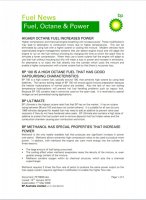Back onto topic (kind of)... Borris you are correct of course that ethanol can, accordingly to a lot of fairly reliable sources, damage seals in older vehicles which have rubber components that pre-date the move to blended fuels. I suspect you're particularly aware of this issue as I know you have classic/pre-war cars (as do I).
Actually, the biofuel component in diesel isn't ethanol, but fatty acid methyl esters (FAME). That is alleged to damage old-school components etc in high concentrations but I'm not clear how badly, compared to the ethanol (in petrol) issue.
Some manufacturers say "no biofuels" in their manuals/stickers but I gather that actually means don't use high concentration biodiesel, ie 20%+, up to 80% in some markets, which isn't available in the UK anyway. I've not seen anything about not using UK/European B7 (ie 7%) blends.
In any case, I suspect we actually have no choice. I must say I doubt that BP can now state that Ultimate Diesel never contains any biofuel (although I'd be interested in any recent statements they've actually made). Indeed, the EN 590 spec for UK diesel allows for up to 7% biofuel. On a classic car forum I follow, I read (but can't validate) that Shell admitted in response to a written query that their their V-Power contains "up to the allowed 5% maximum" of biofuel, but this varies according to season". I think those are weasel words and I'm betting that it's because all the current base fuel stocks, whether petrol or diesel, have the biofuel component blended in at refinery stage - ie while the fuel is still generic - so the brand owners are unable to control the level of bio (up to the 7% level) in what they're selling, even if they wanted to.
Probably more info than you wanted, I got on a roll, but feel free to ignore!




















